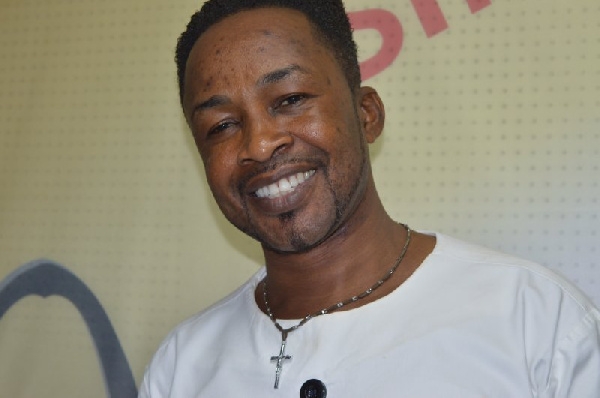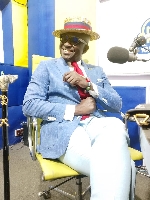Nicholas Omane Acheampong sold sponges to fund music, cater for mother, sponsor bro’s secondary school education
 Tabitha Kum hitmaker Nicholas Omane Acheampong
Tabitha Kum hitmaker Nicholas Omane Acheampong
Zaphnat Panea (Edin No Ye Hu) hitmaker Nicholas Omane Acheampong has narrated how relocating to Accra from his Ashanti regional village tested his mettle but eventually proved immensely rewarding, spinning his life around for the better.
The award-winning singer-songwriter spoke on No.1 105.3 FM's No.1 Live Worship programme on Wednesday, June 7, 2023.
He said arriving in Accra, “having nowhere to sleep,” but yet noticing how “better it was” or could be compared to the village he was in prior, he had “a lot of motivation” to stay and work.
He sold sponges in the capital city of Ghana, till he had gathered enough money to have his first studio session, he revealed to host Apostle Bismark Owusu (ABO).
“God was with me as I sold the sponges and little by little, I gathered money and because of the grace, I got money to go to the studio for the first time to record,” he said.
To stress his hard work, determination, and how he has always been a self-funded independent artiste, he said, “From my beginnings till now – we are live on the big radio talking [publicly] – no one in Ghana can say: ‘I [executive] produced Omane’. No.”
He also highlighted that God being with a person and sending them on a mission does not guarantee an "asphalt-smooth" journey as some clergy members and christians are in the habit of claiming. However, he said, “wisdom is the foundation of life”.
In fact, “take wisdom out of life and all you have left is suffering and agony,” he posited.
Explaining what he meant by wisdom, he encouraged his audience to first identify and “define their special grace given by God,” and “recognise that anyone on a mission for God, humility is supposed to be their bedrock”.
This is the life he lived arriving in Accra aged 14, he said. “I had to humble myself and do whatever I could to earn some money to buy food and send some to my mother,” he added. “I was full of the grace for sure but because there was no helper, I had to stoop low.”
Visibly glad sharing his testimony, he declared: “It was through selling the sponges that God gave me my breakthrough.”
He said with proceeds from selling the sponges on the streets of Accra, he even funded his “brilliant elder brother’s secondary school education”.
He remarked that to optimise sales doing such a job, “you need to cover a lot of space, in order to cover a lot of people” instead of standing at one place as he has observed among street hawkers nowadays.
One needs to wear flip-flops otherwise called “chale wote,” he advised, “and walk”. According to him, wearing sneakers “would hurt your feet”.
Speaking about his daily routine in those days, he explained that he would buy the sponges at Rawlings Park, cut them up, “buy koko [porridge] for breakfast,” and set off to sell. According to him, he would “cover the whole of Adabraka, within 30 minutes, cover [Kwame Nkrumah] Circle, Caprice, Tesano, Lapaz – by 3:30 in the evening, I’d be at Ofankor Barrier.”
He asked ABO to “imagine the number of people I’d have met by then who would want sponges”.
According to Nicholas, nicknamed Kwaku Mane by his family, in the days he elaborately described, he could make "a bag full of money" selling sponges.
This was a great contrast to being with his mother in the village where they struggled to feed and often settled for cola nuts and mushrooms from felled palm nut trees.
Trending Entertainment

Lord Kenya hasn't stopped music; 'it is a talent God has given me'
18:31
Lord Kenya would collaborate with King Paluta on one condition
18:22
Woman who faked being a man to get into Magic Circle finally allowed in
17:28
Osinachi: 'Ekwueme' hitmaker's husband sentenced to death by hanging
17:30
KKD recounts early career challenges at GBC over rap and music mixing
10:11
GTA joins Buzstop Boys in Nationalism Park clean-up drive
09:25
NFA calls Ghanaian TV stations to order over rampant copyright infringements
03:30
George Clooney is optimistic America has better days ahead
00:47
Carlos Santana rushed to hospital prior to concert
00:51



